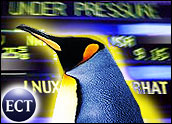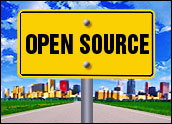Sun Microsystems on Thursday revealed it has forged 21 deals with original equipment manufacturers (OEMs) during the last four months. The massive announcement provides an objective sign of growth in open-source technologies, according to the company.
But is demand for alternative, open-source computing technologies, including the Java Desktop System, StarOffice suite and Sun Ray thin client, really surging globally? Or is the rising tide of the IT economy simply lifting all supplier boats?
“Sun’s unique position allows it to offer a range of hardware and software products — from desktop operating systems to an office productivity suite — to satisfy the demand for affordable, comprehensive, and reliable desktop technologies,” Curtis Sasaki, vice president of desktop solutions at Sun, said in a statement.
However, two research reports by leading consultancies suggest Sun’s growth is not independent of the overall economy.
21 New Deals
On a macro level, the global software landscape appears to be shifting rapidly to open source. In Taiwan, for example, the government recently initiated a move away from relatively expensive proprietary technologies, said Wenson Chang, president of Taiwan-based computer maker Naturetech.
Much of the global growth of Java appears to be driven by government purchases, added Mark Johnston, president and CEO of Tadpole Computer. He noted that his customers, including the U.S. Army, U.S. Air Force, U.S. Navy and U.S. Marine Corps, are using Java Desktop technologies as they seek to lower costs.
Overseas Growth
Government customers overseas are also in the market for open-source computing technologies as an alternative to proprietary systems.
“Our customers throughout the United Kingdom, particularly in the education community, have demanded desktop software alternatives to the high-priced, virus-prone systems that used to be their only option,” said Peter Stuart, director of marketing at UK-based Pebble Rock.
Indeed, custom-computer makers already are preinstalling Sun’s Java Desktop System in tailor-made products, primarily in the educational and government markets. Other deals have been signed with partners in China, Japan and South Korea.
Wal-Mart Push
Sun is even getting into the consumer market with its offerings. The company has begun offering the Java Desktop System on Microtel computers via Walmart.com.
Microtel desktop PCs use many of the same components as other major PC brands, but they are sold through U.S. discount retailers. According to Jonathan Schwartz, president and COO of Sun, “By collaborating with a premier PC manufacturer and distributor … we are able to deliver on the demand for alternative desktops to new and diverse markets.”
Overall, Sun’s Sasaki said the deals, announced en masse on Thursday, “validate the market demand for desktop alternatives.”
Overall IT Spending Rising
However, rather than merely indicating growth for Sun, the deals also may signal a rebound in the IT spending market for the first time in years, according to research reports.
Thomson Financial, a research firm, said first-quarter filings by publicly traded companies in the United States indicate that capital spending, including IT purchases, will grow for the first time since December 2001.
This forecast was confirmed by another independent report reviewed by LinuxInsider. That recent survey, by financial-services advisory firm Celent, showed IT spending in the U.S. securities industry — by Wall Street investment firms, banks, credit card companies and the like — will rise for the first time in two years to US$26.1 billion. That niche market alone will hit $27 billion in 2005.
Rising capital expenditures could mean the U.S. economy has turned the corner and is in full expansion mode, not just a recovery stage. And that could be welcome news for nearly everyone.






































